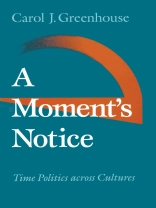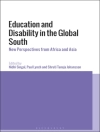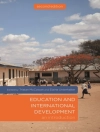Focusing on the problem of time—the paradox of time’s apparent universality and cultural relativity—Carol J. Greenhouse develops an original ethnographic account of our present moment, the much-heralded postmodern condition, which is at the same time a reflexive analysis of ethnography itself. She argues that time is about agency and accountability, and that representations of time are used by institutions of law, politics, and scholarship to selectively refashion popular ideas of agency into paradigms of institutional legitimacy.
A Moment’s Notice suggests that the problem of time in theory is the corollary of problems of power in practice. Greenhouse develops her theory in examinations of three moments of cultural and political crisis: the resistance of the Aztecs against Cortes, the consolidation of China’s First Empire, and the recent partisan political contests over Supreme Court nominees in the United States. In each of these cases, temporal innovation is integral to political improvisation, as traditions of sovereignty confront new cultural challenges. These cases return the discussion to current issues of inequality, postmodernity, cultural pluralism, and ethnography.
विषयसूची
Preface
Introduction Part I
1. Time, Life, and Society
2. Relative Time and the Limits of Law
3. Agency and Authority Part II
4. Time and Territory in Ancient China
5. Time and Sovereignty in Aztec Mexico
6. Time, Life, and Law in the United States Conclusion: Postmodemity This TimeNotes
References
Index
लेखक के बारे में
Carol J. Greenhouse is Professor and Chair in the Department of Anthropology at Princeton University. She is the author of Praying for Justice: Faith, Order, and Community in an American Town and coauthor, with Barbara Yngvesson and David M. Engel, of Law and Community in Three American Towns, both available from Cornell.












